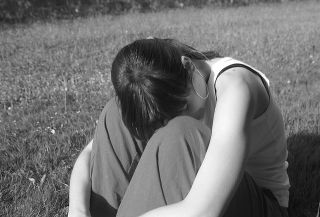Embarrassment
Are You Embarrassed?
Embarrassment and guilt stem from holding yourself to unrealistic standards
Posted February 6, 2013

I was horribly embarrassed by what I did. Not recently, but over thirty years ago. Yes, over thirty years ago! My husband was a graduate student and we lived on an apricot ranch near the university. I helped bring in much-needed income by working in the drying sheds in the summer.
One morning, in excitement, I shared with a co-worker that I'd just found out I was pregnant. After our lunch break, she came up to me with something pretty in the palm of her hand and said, “This is to celebrate your pregnancy.” Thinking it was a rock, I took hold of it roughly. Suddenly, it started oozing fluid on my fingers. She looked at me in horror and yelled, “What are you doing? That’s a chrysalis!”
If the hard skin of a chrysalis becomes detached from a catepillar's silk pad, but is handled very gently, it can be reattached and still become a butterfly. But this one would not become a butterfly. I was so embarrassed that I spent the rest of the day caught up in painful self-recrimination. And every time I saw my co-worker talking to others, I was convinced she was telling them what I’d done, which only served to intensify my embarrassment and self-blame.
But what crime had I committed? I’d accidently mistaken a chrysalis for a rock. For over thirty years, whenever I’d recall that incident, I’d suffer embarrassment all over again.
What is embarrassment? In general, embarrassment is an emotional response to an innocent mistake. The major reason that some of us are embarrassment-prone is that we’ve been conditioned to set unrealistically high expectations for ourselves and to judge ourselves negatively when we can’t possibly meet those standards. A second reason that makes us susceptible to embarrassment is that we’ve been taught to take our cue in evaluating ourselves from what we assume (often erroneously) to be others’ opinions of us. Where there's embarrassment, its equally painful cousin, guilt, is not far behind.
The good news is that these are learned, conditioned behaviors and, as such, can be changed. The Buddha said that nothing is as soft and pliant as the mind. Now, 2,500 years later, neuroscientists are also finding this to be the case. So, even if we’ve been conditioned to be our own harshest critics—so easily embarrassed—we can unlearn that behavior.
Does embarrassment serve a constructive purpose? Not as far as I can tell. I suppose it could be argued that it contributes to social control. But in my opinion, all it does is cause us to hold ourselves to impossible standards. And it doesn’t particularly lead to constructive behavior in the future. Sure, if someone ever handed me a chrysalis-shaped object again, before taking hold of it, I’d check it out carefully. But what are the odds of that happening in my life?!
How I finally shed that embarrassment of over thirty years ago. The change occurred after I became chronically ill. At first, I was embarrassed that I wasn’t recovering from what appeared to be an acute viral infection. Other people get sick and recover. What was wrong with me that this wasn’t happening? And so, there’s that first factor: I was holding myself to an impossible standard (impossible in the sense that I can’t control whether my body recovers from a virus or not) and this led to engaging in negative self-judgment.
And the second factor was present too: I was evaluating myself based on what I was afraid others might be thinking about me. I was embarrassed simply by the thought that they might think I was a malingerer and so I’d try to hide from others how sick I was.
Then I had an experience that helped me shed that well-ingrained conditioning to so easily become embarrassed. I was in front of my house and a neighbor walked up and started chatting about the gardens on our block. After about ten minutes, I realized I wasn't able to keep standing up.
This was the usual signal for negative self-judgment to arise, followed quickly by embarrassment. But instead, to my surprise, I heard myself saying, “I’m sorry but it’s hard for me to stand up for long periods so I need to sit down.” And, because there was no chair in sight, I sat right down on the cement sidewalk! Sitting on the sidewalk, I continued our chat even though she towered over me. I wasn’t embarrassed because I recognized that my intention was good—to take care of myself.
When I returned to the house, I thought about what I’d done—me who’d get embarrassed if I tripped on a crack in the sidewalk had been perfectly willing to sit right down on it! I reflected on what would happen if I let go of my focus on what other people might be thinking about me (which is so often an incorrect perception anyway). To do this, I asked myself whether others do the same things that I’d been judging myself so harshly for all my life. Do other people trip on sidewalks? Of course!
And then came the big question: Might other people have mistaken that chrysalis for a rock? Yes! This reflection loosened the tight-fisted grip that embarrassment held over me.
For the first time in decades, I saw that, regardless of whether I make a good faith mistake (as I had with that chrysalis) and regardless of whether I act unconventionally (as I had when I sat on the sidewalk), embarrassment served no purpose. It didn’t ease my suffering and it didn’t ease that of others. This is my litmus test for evaluating thoughts and actions—do they ease or intensify suffering for myself and others?
After thirty years, it’s such a relief to finally be free from embarrassment over that chrysalis. Now, instead of embarrassment arising when I think of that day in the drying shed, I feel compassion for myself. All I did was make an innocent mistake—a mistake that I then turned into self-blame, which did nothing but ruin the excitement I felt about being pregnant.
© 2013 Toni Bernhard. Thank you for reading my work. I'm the author of four books:
How to Be Sick: Your Pocket Companion (for those who've read How to Be Sick and for those who haven't). May 2020
How to Live Well with Chronic Pain and Illness: A Mindful Guide (2015)
How to Wake Up: A Buddhist-Inspired Guide to Navigating Joy and Sorrow (2013)
All of my books are available in audio format from Amazon, audible.com, and iTunes.
Visit www.tonibernhard.com for more information and buying options.
Using the envelope icon, you can email this piece to others. I'm active on Facebook, Pinterest, and Twitter.




